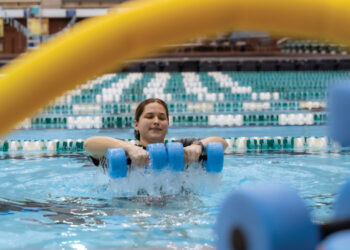Josh Downing was told by one of his mentors that he’d be more of a counselor in 2020 at Butler University.
The mentor wasn’t far off. “I don’t want to call myself necessarily a counselor; I would say listener,” said Downing. “It was a lot of how can I support and advocate — a lot of checking in.”
However, as the director of Recreation and Wellness at Butler University, Downing’s role in 2020 wasn’t one he or his team were necessarily strangers to. In fact, one could say they were all well equipped to take on roles as listeners during a year of negative impacts on mental health because of their experience with Mental Health First Aid (MHFA).
MHFA at Butler University
MHFA is a certification similar to a CPR and First Aid certification. Beth Lohman, the associate director of Fitness and Wellness, shared it’s like knowing CPR. You can identify an emergency, maybe even defuse it a bit, and then get professional help — all without a medical degree.
Lohman and Katie Wood, the assistant director for Health Promotion and Wellness, were MHFA certified in November 2019. Prior to COVID-19, 48 faculty, staff and students were trained in MHFA. By the end of 2021, they will have 140 faculty, staff and students with MHFA training.
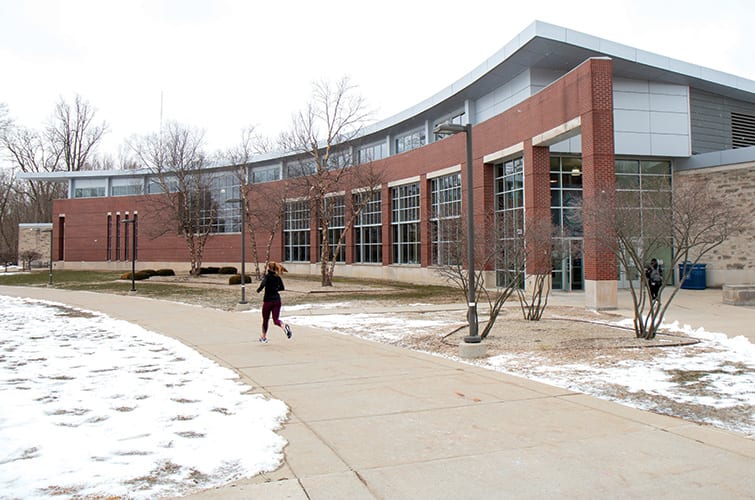
“You can help someone with their mental health without getting an additional college degree,” she said. “It’s an amazing training that empowers participants to recognize signs and symptoms of varying levels of mental health challenges from early to a full-blown crisis and teaches skills to help individuals get the help they need.”
The idea is to equip more people on campus to handle situations with the rising rate of mental health concerns and disorders. “If we have 200 MHFA people trained on campus, you can start to really affect the mental health crisis,” said Downing. “We’re frontloading it so hopefully we can do our best to help the professionals/counseling centers with this. It’s not on them to fix the problem. This is an ‘all of us’ thing.”
But Recreation and Wellness’ proactive approach to mental health and wellness doesn’t end there. One can find it across all of campus with focused collaboration.
The Butler University Well-being Initiative
Scott Peden, the executive director of Student Health and Recreation, works to make sure Health Services, Counseling, and Recreation and Wellness are all moving in the same direction. The collaborative approach between departments has afforded them many opportunities to drive what Peden called Butler University’s well-being bus.
One of those collaborations specifically is BUBeWell, a campus-wide well-being initiative led by Recreation and Wellness.
“BUBeWell was largely born out of that ethos — how do we capitalize on the many existing resources and wellness champions across campus so we can be mindful of not duplicating our work, or better yet, what opportunities are out there we can partner on to leverage our resources?” shared Peden.
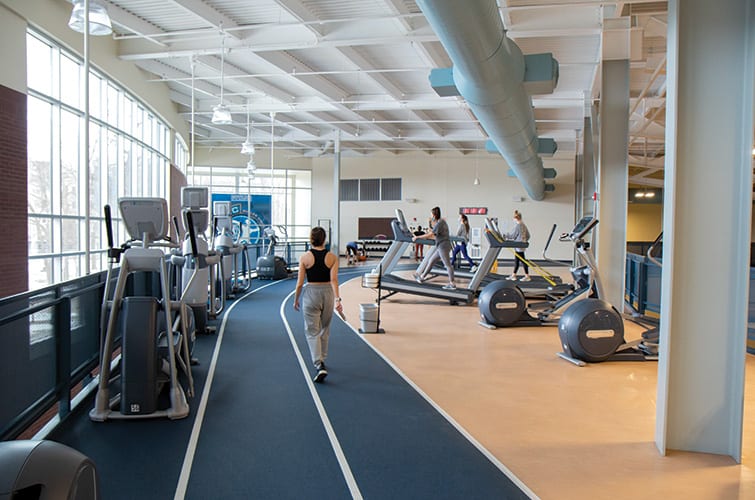
BUBeWell kicked off in the fall of 2018 and went virtual during the COVID-19 pandemic. Prior to launching, Downing said they had all of the marketing and branding materials ready to go. He traversed campus and sat down with 30 stakeholders, offices and administrators to get their buy-in.
With the well-thought-out plan in hand, Downing got zero push back on the initiative. “Figure out a way to tell the story so people can gravitate toward it. That will draw more people in,” said Downing.
BUBeWell’s Role on Campus
BUBeWell’s impacts are many: Learning outcomes in all areas of student affairs are connected to BUBeWell. Spring 2021 is seeing a launch of a financial education platform with EVERFI that will be a requirement of all first-year students. A BUBeWell monthly employee newsletter is sent to 150 recipients. Plus, Lohman is constantly designing and implementing new well-being initiatives, which includes MHFA.
It’s a powerful initiative that people are recognizing across campus. “I gathered research in Fall 2020 and found most faculty and staff believe students know that BUBeWell represents well-being and taking care of yourself,” said Lohman.
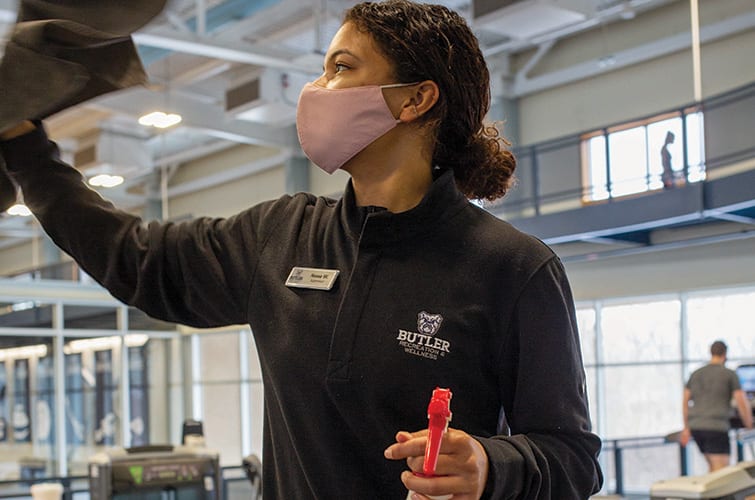
In fact, BUBeWell is expanding its efforts. Peden shared are scaling many aspects to not just students but employees as well. One day he hopes most campus-wide decisions — from policies and academic schedules to food and beverage options — will be made through the lens of well-being.
“My hope is we can continue building off the great foundation that has been set within the framework of BUBeWell,” said Peden. “If we can get our whole community actively engaged with us, I truly feel we will have changed the overall culture at Butler for the better — not only for individuals on their personal wellness journey, but in terms of collective values.”
Other Offerings in Recreation and Wellness
An actively engaged community requires a variety of options and offerings. Recreation and Wellness had a fast-growing club sports program prior to COVID-19. The Health and Recreation Complex (HRC) boasts 85,000 square feet. It houses not only Recreation and Wellness, but Health Services and Counseling and Consultation Services as well.
Butler has also hosted National Exercise Trainers Association fitness workshops; provides functional training spaces with Rogue, Tag and Xult equipment; and has seen about 50% of students participating in intramural sports, made possible through partnerships with IMLeagues, Proforma and Nike.
Downing said since the HRC opened in 2006, they have helped transform the campus on supporting overall well-being. While COVID-19 is definitely the biggest challenge Butler Recreation and Wellness has faced, Downing said it’s also been a wonderful opportunity to reimagine everything from protocols and facility layout to staff training and programming.
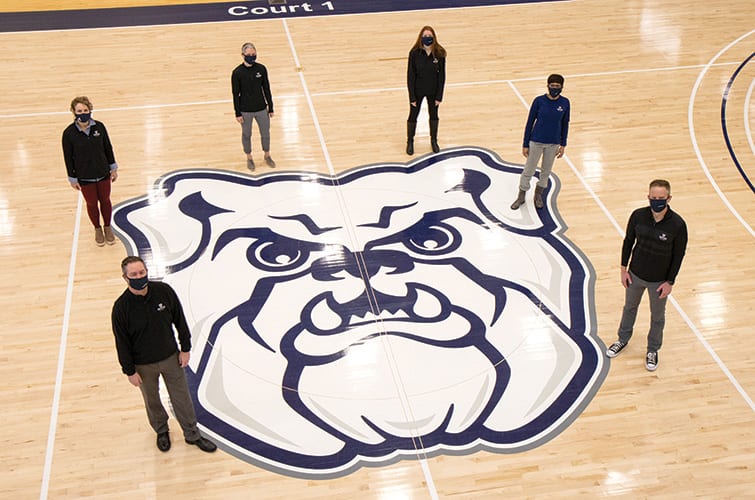
Whether it’s been putting together pop-up events — like making your own hand sanitizer with essential oils — or randomly showing up to the main part of campus to play Kan Jam and cornhole, Butler Recreation and Wellness has refused to let the pandemic stop it. MHFA training is still in full swing and well-being will still be a campus-wide priority.
Tradition, as Downing put it, needed to be thrown out the window in 2020. And the team stepped up to pivot in order to fulfill the mission of Butler Recreation and Wellness.
“Innovative, inclusive, dedicated, mission-driven, proactive, engaged, energetic and fun are some of the words that describe the team,” said Downing. “We see the big picture, and that is supporting the campus’ overall well-being. We play and understand our part in that mission.”






